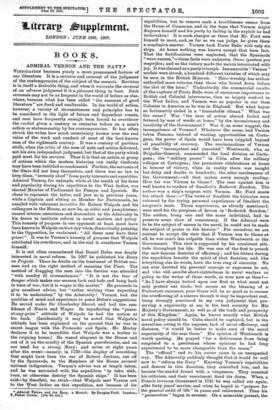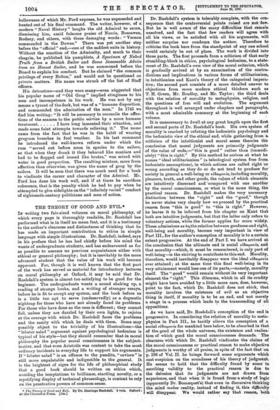BOOKS.
ADMIRAL VERNON AND THE NAVY.*
VINDICATION becomes yearly a more pronounced feature of our literature. It is a revision and reversal of the judgment of the centemporaries of the subject of the memoir. Revision is in itself a desirable thing, and when it warrants the reversal of an adverse judgment it is a pleasant thing to boot. Such reversals may not be as frequent in the world of letters as else- where, because what has been called "the essences of good literature" are fixed and unalterable. In the world of action, however, a variety of circumstances and principles has to be considered in the light of future and dependent events, and men have frequently enough been forced to overthrow the verdict given a century or centuries before on a man's action or statesmanship by his contemporaries. It has often struck the writer how much uncertainty hovers over the real value of the work and conduct of most of the best-known men of the eighteenth century. It was a century of partisan strife, when the critic of the men of note and action delivered, not his own independent judgment, but that of the party which paid most for his services. Thus it is that an action or group of actions which the modern historian can easily vindicate may have been belittled or condemned. Further, the servants of the State did not keep themselves, and there was no law to keep them, "serenely aloof " from party interests and squabbles. Admiral Vernon, for eximple, while at the zenith of his fame and popularity during his expedition to the West Indies, was elected Member of Parliament for Penryn and Ipswich. He chose to represent the latter, and just as in previous years, while a Captain and sitting as Member for Portsmouth, he assailed with vehement invective Sir Robert Walpole and his colleagues in the House, so now he, as critic and pamphleteer, caused intense uneasiness and discomfort to the Admiralty in his desire to institute reform in naval matters and polioy This honesty of purpose in one opponent at least must have been known to Walpole on that day when, dramatically pointing to the Opposition, he exclaimed: "All these men have their price!" It was to Vernon's honesty of purpose that Walpole attributed his overthrow, and in the end it overthrew Vernon himself.
It is not often remembered that Daniel Defoe was deeply interested in naval reform. In 1697 he published his Essay on Projects. There he dwells on the treatment of British sea- men ind on the right method of manning the Fleet. The method of dragging the men into the Service was attended "with sundry ill circumstances." "It is not the fear of danger which makes our seamen lurk and hide and hang back in time of war, but it is wages is the matter." He proceeds to give excellent advice, but "rather wishing than expecting it to be undertaken" by the Admiralty ! Vernon had the qualities of mind and experience to press Defoe's suggestions. He served under Sir Cloudesley Shovel, and bad the con- fidence of Norris and Wager. In repudiating the "peace. at-any-price" attitude of Walpole be had the nation at his back. (Incidentally it may be noted that Walpole's attitude has been explained on the ground that he was in secret league with the Pretender and Spain. Mr. Morley declares it to be incredible that Walpole was a traitor to the reigning house.) He waxed eloquent in the House and out of it on the cruelty of the Spanish guardacostas, and on our need for a strong Navy; and seven or eight years after the event—namely, in 1739—the display of something that might have been the ear of Robert Jenkins, out off by the Spaniards, to the Members of the House aroused national indignation. Vernon's advice was at length taken, and he was entrusted with the expedition " tp take, sink, burn, or otherwise destroy the Spanish ships." It has been said—by Smollett, we. think—that Walpole sent Vernon out to the West Indies on this expedition, not because of his
• .kledrid irenon and tho lean 3 a Mame% by &nine Ford. Loudon T. Mahar tfawia. DOA. ed. nat.] capabilities, but to remove such a troublesome censor from the House of Commons, and in the hope that Vernon might disgrace himself and his party by failing in the exploit he had undertaken! It is such charges as these that Mr. Ford sets himself to meet, and, as far as we can judge, he gives them a conclusive answer. Vernon took Porto Bello with only six ships. At home nothing was known except that bare fact. That the fortifications were neglected, that the Spaniards "were unseen,"—these facts were unknown. Nine ignotum pro magni:dco; and so the victory made the nation intoxicated with joy. It was claimed as a party triumph. Innumerable "Vernon" medals were struck, &hundred different varieties of which may be seen in the British Museum. "Hero-worship has seldom enthralled more votaries than those who bowed down before the idol of the hour." Undoubtedly the commercial results of the capture of Porto Bello were of enormous importance to British and Colonial intercourse, then so largely centred in the West Indies, and Vernon was as popular in our then Colonies in America as he was in England. But what began so fortunately ended in a "lamentable climax." What was the cause? Was "the man of action abroad fooled and fettered by men of words at home," by the inconsistency and inactivity of the Government? Was it, as some suggest, the incompetence of Vernon? Whatever the cause, had Vernon taken Panama instead of wasting opportunities on Carta- gena, the power of Spain would have been crippled beyond all possibility of recovery. The recriminations of Vernon and the "incompetent and conceited" Wentworth, who, as Brigadier-General, commanded the land division at Carta- gena ; the "military picnic" in Cuba after the military collapse at Cartagena; the premature celebrations at home in honour of victory, when in reality there was naught but delay and deaths in hundreds; the utter carelessness of the Government,—all that makes sorry enough reading. How far was Vernon to blame ? The case 'against him is well known to readers of Smollett's Roderick Random. The author was a ship's surgeon with Vernon. Mr. Ford meets his attack thus :—" The views of Suiollett the historian were coloured by the trying personal experiences of Smollett the surgeon's mate. Those experiences, as already mentioned, were used for the purposes of fiction in 'Roderick Random.' The author, being one and the same individual, had to preserve some show of consistency. If the Admiral were to be the subject of sneers in the novel, he could not be made the subject of praise in the history." For ourselves, we are content to accept the view that if Vernon was to blame at all, he was much less culpable than either Wentworth or the Government. This view is supported by his consistent atti- tude throughout his life. He was one of the first to preach the now famous doctrine of efficiency ; and his letters during the expedition breathe the spirit of that doctrine, and, like everything else he wrote, have the true ring of sincerity. No one ever doubted his personal courage or eagerness to act, and who will ascribe short-sightedness in naval warfare or policy to the writer of these words, as true now as then "As I have always looked upon our fleet as what must not only protect our trade, but secure us the blessing of a Protestant successor, your Grace will be so good as to excuse the overflowing of a sincere though it may be imprudent zeal, being strongly convinced in my own judgment that pre- serving a superiority at sea is the best security for His Majesty's Government, as well as of the trade and prosperity of this Kingdom." Again, be knows exactly what British naval policy should be. Cuba should be captured, but in the meantime, owing to the expense, lack of naval efficiency, and distance, "it would be better to make sure of the naval superiority of the seas there." His opinion of Wentworth is worth quoting. He prayed "for a deliverance from being conjoined to a gentleman whose opinions he bad long experienced to be more changeable than the moon."
The "official" end to his career came in an unexpected way. The Admiralty suddenly thought that it would be well now to "reform the Navy" Knowing Vernon's capabilities and desires in this direction, they consulted him, and he became the candid friend with a vengeance. They resented his criticism, and their resentment fixed his doom. When a French invasion threatened in 1745 he was called out again, afthr forty years' service, and when he hoped to "prepare for the general audit of life" in peace and retirement. Then his "persecution" began in earnest.. On a miserable pretext, the hollowness of which Mr. Ford exposes, be was superseded and hunted out of his final command. The writer, however, of S modern" Naval History" laughs the old Admiral to scorn, dismissing him, amid fulsome praise of Norris, Bescawen, Rodney, and others, with these damaging words : "Vernon commanded in the Downs." There was yet another step before the "official" end,—one of the saddest exits in history. Without the sanction of the Admiralty, and much to their chagrin, he published his pamphlets, A Specimen of Naked Truth from a British Sailor and Some Seasonable Advice from an Honest Sailor, and he was summoned before the Board to explain his conduct. But be claimed "the common privilege of every Briton," and would not be questioned on private matters. His name was struck off the list of Staff officers.
His detractors—and they were many—even sfiggested that his popular name of "Old Grog" implied stinginess to his men and incompetence in his work. He was not by any means a tyrant of the deck, but was of a "humane disposition, and commanded the admiration of the men." In 1745 we find him writing: "It will be necessary to reconcile the affec- tions of the seamen to the public service by a more humane
treatment. I have long lamented their situation, and made some faint attempts towards relieving it." The name came from the fact that he was in the habit of wearing grogram breeches in foul weather. In his last command he introduced the well-known reform under which the ram "served out before noon in species to the sailors, so that when they drank it they behaved like maniacs and had to be flogged and ironed like brutes," was mixed with water in good proportion. The resulting mixture, more from affection than otherwise, was given the name of grog by the sailors. It will be seen that there was much need for a book to vindicate the career and character of the Admiral. Mr. Ford has done his work well, and if at times he sacrifices coherence, that is the penalty which he bad to pay when he attempted to give sidelights on the "infinitely varied" conduct of eighteenth-century politicians and men of action.

















































 Previous page
Previous page